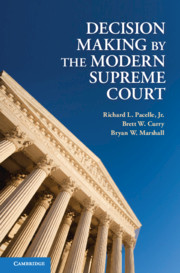Book contents
- Frontmatter
- Contents
- Acknowledgments
- 1 The Supreme Court
- 2 Heuristic Models of Judicial Decision Making
- 3 Building an Integrated Model of Decision Making
- 4 Decision Making on the Modern Supreme Court
- 5 Building a New Legacy
- 6 Sharing the Protection of Minorities
- 7 Avoiding Another Self-Inflicted Wound
- 8 Policing the Boundaries
- 9 Conclusion
- Measurement Appendix
- Cases Cited
- References
- Index
Measurement Appendix
Published online by Cambridge University Press: 05 June 2012
- Frontmatter
- Contents
- Acknowledgments
- 1 The Supreme Court
- 2 Heuristic Models of Judicial Decision Making
- 3 Building an Integrated Model of Decision Making
- 4 Decision Making on the Modern Supreme Court
- 5 Building a New Legacy
- 6 Sharing the Protection of Minorities
- 7 Avoiding Another Self-Inflicted Wound
- 8 Policing the Boundaries
- 9 Conclusion
- Measurement Appendix
- Cases Cited
- References
- Index
Summary
There is some relative consensus at least regarding the problems faced in measuring political preferences, but a wide-ranging debate remains in the discipline over the best means or approach to do so. Recent work has shown a great breadth of empirical and theoretical innovation in estimating preferences (see for example Poole 2005; Bailey 2007; Epstein, Martin, Segal, and Westerland 2007). Bailey's work develops estimates of preferences by harnessing a variety of behavioral information (e.g. votes, positions, and cases) to bridge institutions and time using a Bayesian Markov Chain Monte Carlo (MCMC) approach. The method provides valid dynamic preference estimates that can be compared across institutions and over time. The NOMINATE Common Space (Poole 2005; Poole and Rosenthal 1997) scaling procedure produces preferences for comparing both chambers and the president. Epstein, Martin, Segal, and Westerland (2005; 2007) have created the Judicial Common Space measure which maps judicial preferences on the same space as the Common Space for the Congress and President.
Scholars have made strong arguments on both sides of the Bailey and Common Space measurement issue. For example, Bailey, Kamoie, and Maltzman (2005) employ Bailey's preference estimates in order to make inter-institutional comparisons between the president and Court. Their model assesses the effect of the solicitor general on the justices' support of amicus briefs for all civil liberties cases from the 1953–2002 terms.
- Type
- Chapter
- Information
- Decision Making by the Modern Supreme Court , pp. 215 - 218Publisher: Cambridge University PressPrint publication year: 2011

